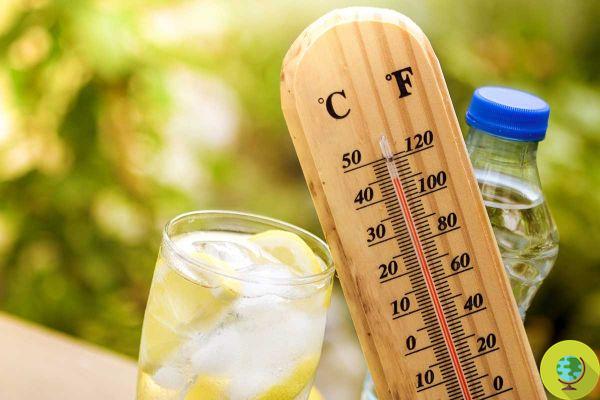
Hot and muggy: in case of heat stroke, do not give paracetamol or acetylsalicylic acid. The WHO Guide.
Don't store avocado like this: it's dangerousWe all noticed: the heat these days is really unbearable. We must defend ourselves to avoid consequences that can even be serious, especially for the elderly and children. To help us came the WHO guide with a series of tips to cope with the record heat, which point the finger on the side effects of administering antipyretic drugs, for example aspirin or tachipirina (paracetamol), in case of heatstroke.
If a person has very hot skin, is delirious or has seizures, call a doctor immediately and while waiting, move them to a cool place, put them in a horizontal position by lifting their legs and hips, take off their clothes and use cold compresses on the neck, armpits and groin. to bring down the temperature. Water at 25-30 ° can also be sprayed on the skin. But paracetamol in these cases is absolutely not to be administered.
Since this summer could be even hotter, it's good to know what to do. Excess heat, in fact, has very heavy physiological impacts on our organism, especially in those who are already tried by pre-existing conditions, such as chronic diseases.
Here then WHO advice to best overcome heat waves:
Index
Keep the house cool
- Check the room temperature which should be below 32 ° during the day and 24 ° at night. This is especially important for children, the elderly and sick people.
- During the day, close windows and shutters, especially those most exposed to the sun. Turn off all artificial lighting and, if possible, also all electrical devices.
- Cool down the house at night, open all windows (and also the shutters if possible) until early morning.
- Shade by using awnings or blinds.
- Hang wet towels to cool the air in the rooms
- Those who use air conditioning should close doors and windows so as not to waste energy and create a cool environment.
- Electric fans are useful and provide relief but if the temperature exceeds 35 ° they are unable to prevent heatstroke. To avoid this it is important to drink.
Keep away from the heat
- Especially at night, you should sleep in the coolest room in the house using light sheets and avoiding pillows so as not to accumulate heat.
- If your home is particularly hot, spend 2-3 hours a day in a cool place, even if the air conditioning keeps it cool.
- Do not go out in the hottest moments of the day and always stay in the shade
- Avoid strenuous physical activity. If you really want to do it, better choose the early hours of the morning from 4 to 7.
- Never leave children or animals in parked vehicles NEVER even for a minute!
Keep the body cool and hydrated
- Cool off with showers or baths but also with cold packs, foot baths, sponging or with the help of a wet towel.
- Always wear a wide-brimmed hat or cap, sunglasses, and light clothing made from natural materials.
- Drink regularly avoiding caffeine, alcohol and sugary drinks.
- Eat little and often, avoiding high protein foods
Helping others
- If you know people who live alone, visit them more often and check that they don't need help during the hottest days.
- Talk about the risks of heat waves with your family, everyone needs to know what to do
- If you know people at risk, such as an elderly person, give them advice and support
- If a person is taking medications, ask the doctor if they affect thermoregulation and water balance in any way.
- Attending a first aid course will help you learn how to deal with thermal emergencies as well as other types of risk situations.
If you have any health problems
- Medicines should be stored below 25 ° or in the fridge (read the package leaflet in the storage section).
- Consult your doctor if you are taking multiple medications or have chronic illnesses
If you or others are not feeling well
- Seek help if you experience dizziness, weakness, anxiety, or intense thirst and headache. Move to a cool place as soon as possible and measure your body temperature.
- Drink water or fruit juice to rehydrate the body.
- Rest in a cool place if you have painful muscle spasms in your legs, arms or abdomen (if they last longer than an hour, consult your doctor). Drink solutions containing electrolytes to rehydrate the body.
- If another person feels unwell and unconscious, place them on their side.
- If a person has very hot skin, is delirious or has seizures, call a doctor immediately and while waiting, move them to a cool place, put them in a horizontal position by lifting their legs and hips, take off their clothes and use cold compresses on the neck, armpits and groin. to bring down the temperature. Water at 25-30 ° can also be sprayed on the skin. Paracetamol in these cases is not to be administered.
Read also:
- The African heat will not leave us until July: temperatures still over 40 °
- Summer came hot and muggy. Temperatures over 40 °


























